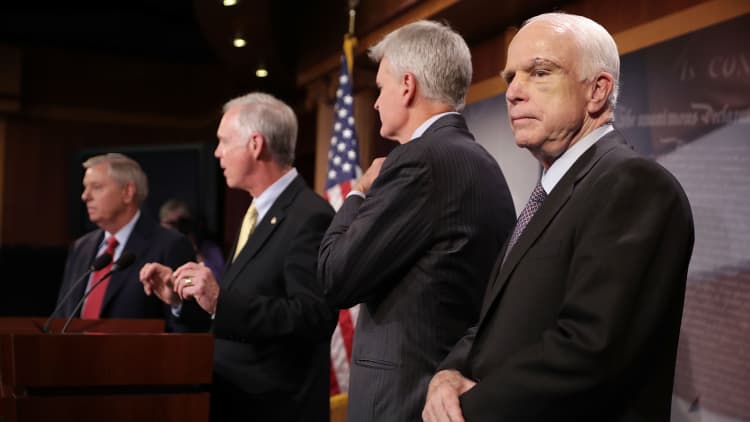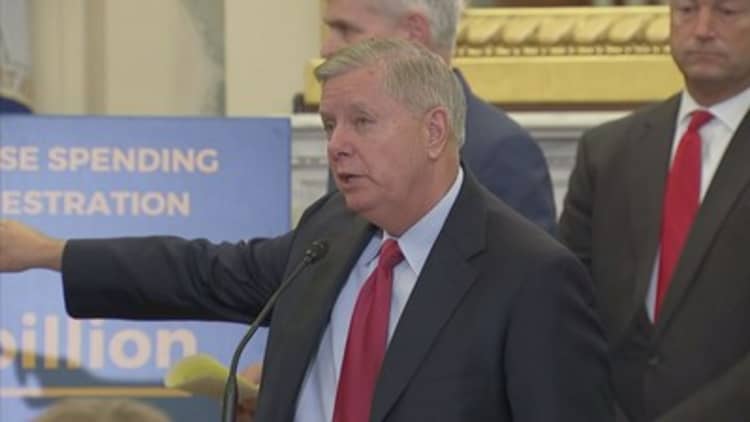
President Donald Trump and his party have just given themselves another self-inflicted wound. And it deepens doubt surrounding their ability to get healthy on tax reform.
The Senate's late-July rejection of the initial push to repeal and replace Obamacare gave Republicans a chance to cut their losses. Congress could have begun a limited bipartisan effort to stabilize insurance marketplaces – which have grown in popularity during this year's repeal battle — while the GOP moved on to the tax debate that unites the party more.
That, in fact, was the party's initial plan. But then Senate leaders succumbed to pressure from their conservative base to target Obamacare one more time before special rules barring a Democratic filibuster expire on Sept. 30.
It was a long shot from the start. One objection from Republican dissidents stemmed from the rush to enact reforms reordering a large chunk of the American economy; the latest proposal this week came up for consideration even more rapidly.
Moreover, the plan sponsored by Sens. Lindsey Graham, R-S.C., and Bill Cassidy, R-La., suffers the same problems that impeded earlier GOP proposals — and more.
Not only would it have eroded patient protections and left tens of millions of Americans without health insurance, its formula for redistributing federal spending would have required a large bloc of Republican senators to vote "yes" knowing their states would receive less money than under current law.
Sen. John McCain's announced opposition, combined with other GOP holdouts, means that almost certainly won't happen. Which represents a two-pronged setback for the GOP.
First, raising hopes of Obamacare's fiercest opponents and then dashing them again will deepen internal Republican fissures. Trump spent part of his summer ripping Congressional Republicans for failing to deliver; in this week's NBC News/Wall Street Journal poll, 59 percent of Republican voters expressed dissatisfaction with House Speaker Paul Ryan and Senate Majority Leader Mitch McConnell.
Second, days spent on a fruitless quest to repeal Obamacare are days not spent pursuing tax reform.
As Congress enters the final week of September, the White House and senior Republicans still have not even specified a reform proposal. Neither has the House or Senate passed the budget resolution they must agree on to obtain those special filibuster-prevention rules squandered so far on the health debate.
The Republican tax effort still has a chance to succeed. Cutting taxes remains the party's single most unifying priority.
But the GOP still needs to resolve important internal differences.
One is whether to offset tax cuts by cutting spending or closing tax loopholes or both. If not, conservative lawmakers will have to accept higher federal deficits and debt.
Another is whether individual tax-rate cuts should include the top marginal rates paid by high-income Americans or remain confined to those with more modest incomes. Most GOP proposals cut top rates, too, but the White House lately has reflected public opinion favoring a focus on the middle class.
A third is how deeply to cut corporate rates. The only concrete development in Republican-only debates so far has been the demise of an import tax intended to finance cutting the top corporate rate to 15 percent from the current 35 percent.
Reaching consensus on those issues means bridging divisions between populist and business-oriented GOP factions. Right now, those factions are fighting fiercely in an Alabama Senate primary that pits Trump and the GOP leadership's choice, incumbent Luther Strange, against challenger Roy Moore, who is backed by recently dismissed White House strategist Steve Bannon. The two candidates have taken opposite sides of the Graham-Cassidy debate.
Another health-care fumble will heighten urgency to deliver on taxes in advance of 2018 mid-term elections. But that urgency alone hasn't yet proven strong enough to overcome intra-party splits.
The financial stakes of the tax debate add immense business lobbying pressures as well. Reaching consensus also requires time — which the all-Republican government in Washington keeps frittering away.
WATCH: Summers says Graham-Cassidy more dangerous than previous Obamacare repeal bills



